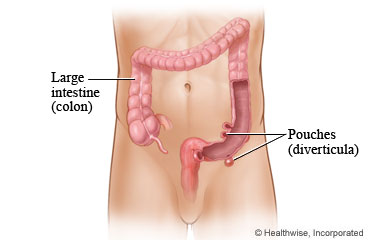
Overview
Diverticulitis occurs when pouches form in the wall of the colon and become inflamed or infected. It can be very painful.
Doctors aren't sure what causes diverticulitis. There is no proof that foods such as nuts, seeds, or berries cause it or make it worse. A low-fiber diet can cause small, hard stools. This means it takes more pressure in the colon to move stools out of the body. This puts more pressure on the walls of the colon. The pressure from this may cause pouches to form in weak spots along the colon.
This condition may sometimes be treated by resting the bowel and taking medicines.
As you recover, high-fiber foods may help you avoid future problems.
Follow-up care is a key part of your treatment and safety. Be sure to make and go to all appointments, and call your doctor if you are having problems. It's also a good idea to know your test results and keep a list of the medicines you take.
How can you care for yourself at home?
- Drink plenty of fluids. If you have kidney, heart, or liver disease and have to limit fluids, talk with your doctor before you increase the amount of fluids you drink.
- Stay with liquids or start with small amounts of food until you are feeling better. Then you can return to regular foods and slowly increase the amount of fiber in your diet.
- Get extra rest until you are feeling better.
- Be safe with medicines. Read and follow all instructions on the label.
- If the doctor gave you a prescription medicine for pain, take it as prescribed.
- If you are not taking a prescription pain medicine, ask your doctor if you can take an over-the-counter medicine.
- If your doctor prescribed antibiotics, take them as directed. Do not stop taking them just because you feel better. You need to take the full course of antibiotics.
- Do not use laxatives or enemas unless your doctor tells you to use them.
When should you call for help?
Call your doctor now or seek immediate medical care if:
- You pass maroon or very bloody stools.
- You have new or worse belly pain.
- You have a fever.
- You have nausea or vomiting.
- You have diarrhea or constipation.
- You have unusual changes in your bowel movements.
- You have bloating.
- You cannot pass stools or gas.
Watch closely for changes in your health, and be sure to contact your doctor if you have any problems.
Where can you learn more?
Go to http://www.healthwise.net/patientEd
Enter H901 in the search box to learn more about "Diverticulitis: Care Instructions".
Current as of: October 19, 2023
Author: Healthwise Staff
Clinical Review Board
All Healthwise education is reviewed by a team that includes physicians, nurses, advanced practitioners, registered dieticians, and other healthcare professionals.

